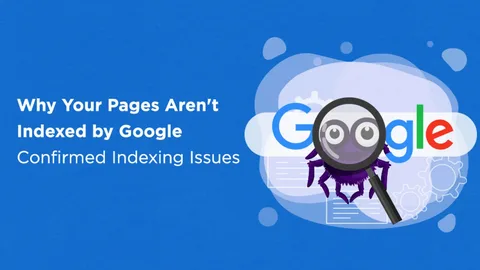Google Indexing Problems & Their Solutions
Blog Summary
- Common Issues:
- Pages not being indexed despite efforts.
- Low-quality competitor content outranking high-quality pages.
- Concerns over AI systems like ChatGPT affecting rankings.
- Challenges with crawling due to Google\u2019s finite resources.
- Why Google Faces Challenges:
- Huge infrastructure costs and scale of operations.
- AI systems used for crawling and indexing are not 100% accurate.
- Google prioritises pages that add unique value.
- Understanding High-Quality Content:
- Quality depends on context (e.g., recipes vs mental health topics).
- Direct and indirect signals like user behaviour and backlinks influence rankings.
- Solutions to Indexing Problems:
- Focus on user satisfaction with engaging, shareable content.
- Build natural authority with consistent publishing and backlinks.
- Improve internal linking, submit sitemaps, and monitor Search Console.
- Avoid shortcuts and trust your expertise in content creation.
- Key Insights:
- Patience is essential; Google may take time to re-evaluate content.
- SEO success lies in persistence, user-centric strategies, and avoiding hacks.
In the ever-evolving landscape of digital marketing and SEO, Google indexing problems are a frequent and frustrating challenge. Whether it’s a site not being indexed, content not ranking as expected, or facing stiff competition from lower-quality pages, these issues can disrupt even the most well-planned strategies. Let’s delve into the common indexing problems and explore insights to tackle them effectively.

Common Google Indexing Problems
1. Pages Not Being Indexed
A common frustration among webmasters is creating valuable content only to find it’s not indexed by Google. Even after submitting a sitemap, generating backlinks, or optimising content, some pages seem to remain invisible to the search engine.
2. Competitors Ranking Higher Despite Low-Quality Content
Many SEOs feel the sting when their high-quality content is outranked by competitors whose content seems less valuable. This raises questions about Google’s evaluation of quality.
3. Concerns Over AI-Generated Content
The rise of tools like ChatGPT and Google’s own generative AI systems has added layers of complexity. Many worry about how these technologies affect content ranking and visibility.
4. Crawling Inefficiencies
With billions of pages on the web, Google’s resources for crawling and indexing are finite. As such, pages that don’t add significant value often get left out of the index.
Why Google Faces Indexing Challenges
The Scale of Google’s Operations
Running a search engine is an enormous task requiring:
- Hardware: Crawling servers, database servers, caching servers, and more.
- Software and AI Systems: Handling crawling, ranking, and indexing decisions.
- Massive Bandwidth: Supporting billions of daily searches.
According to Google’s 2022 reports, they spent nearly ₹2 lakh crore on infrastructure. The sheer scale of this operation means Google must prioritise what to crawl and index.
Decoding “High-Quality Content”
One of the most significant indexing challenges stems from content quality evaluation. While Google frequently emphasises the need for “high-quality content,” it has never explicitly defined what this means. Quality is often context-dependent:
- For a recipe site, detailed instructions and visuals signify quality.
- For a mental health site, empathetic and responsible content is crucial.
Google relies on direct and indirect signals to determine quality, such as user behaviour, content engagement, and natural backlinks. However, even with AI systems, achieving 100% accuracy is challenging.
How Google Evaluates Pages
Google typically indexes a website’s homepage first. From there, it evaluates:
- Content Quality: Is the homepage content valuable and engaging?
- Internal Linking: How well is the content interconnected?
- Sitemap Submission: Is there a clear roadmap for crawlers?
Google’s evaluation process is aided by AI, but even advanced systems make mistakes. An estimated 10% of indexing decisions are flawed, leaving many valuable pages unranked.
Solutions to Google Indexing Problems
1. Focus on User Satisfaction
Google prioritises user satisfaction over everything else. To ensure your content meets this standard:
- Create content that users revisit and share.
- Monitor natural backlinks. If people are linking to your site organically, it’s a sign of quality.
- Encourage engagement through comments, shares, and discussions.
2. Leverage Your Experience
As a webmaster or SEO expert, trust your knowledge. If you believe your content provides genuine value, don’t rush to overhaul it. Allow time for Google to recognise its worth.
3. Avoid Shortcuts and Hacks
Stay clear of black-hat SEO techniques or gimmicks promising quick results. Google’s AI systems are becoming increasingly adept at identifying and penalising manipulative tactics.
4. Improve Internal Signals
Optimise internal linking structures and ensure that all pages are accessible to crawlers. Submit accurate sitemaps and monitor the Google Search Console for errors.
5. Understand AI Limitations
Recognise that Google’s AI systems are not perfect. If your content isn’t indexed, it’s not always due to its quality. Sometimes, it’s simply a limitation of the system.
6. Build Natural Authority
Authority isn’t built overnight. Focus on these strategies:
- Consistent publishing of valuable content.
- Building backlinks from credible sources.
- Encouraging social sharing to amplify reach.
7. Regularly Audit Your Site
Conduct periodic audits to identify:
- Pages with low-quality or duplicate content.
- Broken links or technical issues.
- Crawl errors flagged in the Google Search Console.
Why Patience Is Key
SEO is not a sprint but a marathon. If you’ve followed best practices and still face indexing challenges, the best course of action is to wait. As Google’s systems evolve, they often re-evaluate and index overlooked content. Consistently demonstrating value will eventually lead to recognition.
Final Thoughts
Google’s indexing problems reflect the complexities of managing an ever-expanding internet. While it’s frustrating to see good content ignored, the solution lies in persistence, patience, and a focus on user-centric practices. Avoid shortcuts, trust in the quality of your work, and let time do its part. By aligning your efforts with what truly adds value to users, you’ll ensure long-term success in the world of SEO.




Post Comment